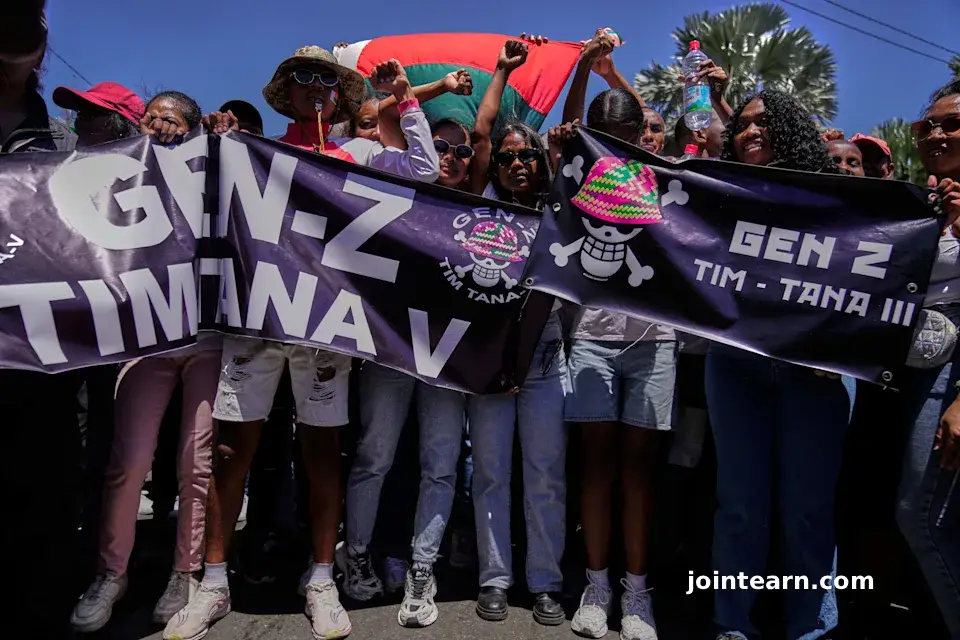
Madagascar has entered a new and uncertain political era after President Andry Rajoelina was ousted in a military coup led by Colonel Michael Randrianirina, commander of the country’s elite CAPSAT military unit. The coup followed weeks of youth-driven protests against poverty, corruption, and failing infrastructure, marking one of the most dramatic uprisings in Madagascar’s modern history.
Youth-Led Protests Ignite Political Crisis
For more than a month, tens of thousands of young Malagasy citizens — largely Generation Z students and workers — flooded the streets of Antananarivo, the nation’s capital, demanding that President Rajoelina step down. What began as protests over chronic electricity blackouts and severe water shortages quickly evolved into a broad-based call for political change, accountability, and economic reform.
“The people are tired of promises,” said Shaniah Rakotohania, an 18-year-old student at Lycee Technique Alarabia. “We study in the dark, live without clean water, and watch the powerful grow richer while our families struggle. This is our future — and we are claiming it.”
The protests drew massive crowds to Independence Avenue, where demonstrators waved Malagasy flags and chanted for new leadership. Civic groups, labor unions, and community organizations soon joined the youth movement, amplifying public pressure on the government.
Military Takes Control After Parliamentary Impeachment
The breaking point came on Tuesday, October 14, when Madagascar’s parliament voted overwhelmingly to impeach President Rajoelina, accusing him of abandoning his duties and leaving the country amid unrest.
Within hours, Colonel Randrianirina — backed by the CAPSAT unit and gendarmerie officers — appeared before the presidential palace, flanked by troops, to announce that the armed forces were taking control of the government.
“We are taking power to restore order and stability,” Randrianirina declared before cheering crowds and soldiers. He added that a transitional military council would be formed, composed of officers from the army and gendarmerie, and that a civilian government would soon follow.
According to Randrianirina, Madagascar’s constitution and High Constitutional Court have been temporarily suspended, with plans for a national referendum within two years to determine the country’s political future.
Rajoelina Condemns Coup from Exile
President Andry Rajoelina, 51, fled Madagascar over the weekend, later issuing a statement from an undisclosed location denouncing the coup as “an illegal seizure of power” and a “serious breach of the rule of law.”
“The Republic of Madagascar cannot be taken hostage by force,” Rajoelina’s office said. “The State remains standing.”
Before fleeing, Rajoelina attempted to dissolve the lower house of parliament to prevent his impeachment — a move lawmakers rejected as unconstitutional.
The ousted leader rose to power himself through a military-backed coup in 2009, led by the very same CAPSAT unit that has now turned against him. His decade-long rule has been marred by accusations of corruption, mismanagement, and failure to alleviate widespread poverty.
Madagascar’s Long Struggle with Instability
Madagascar, an island nation of roughly 30 million people, has a long history of political volatility and economic hardship. Despite being the world’s largest producer of natural vanilla and a global biodiversity hotspot, the country remains one of the poorest on Earth.
According to the World Bank, approximately 75% of Malagasy citizens live below the poverty line, and the nation’s GDP per capita has fallen sharply since independence from France in 1960.
The latest unrest reflects growing frustration among the country’s youth — most of whom have known only economic hardship and political instability. Demonstrators say the failure of public services, such as education, healthcare, and electricity, underscores the urgent need for systemic reform.
“We don’t have electricity, clean water, or jobs,” said Soavololona Faraniaina, one of the protesters. “If Madagascar’s children must study in darkness, what kind of future do we have?”
CAPSAT’s Return to Power and International Response
The CAPSAT unit — officially known as the Corps d’Administration et de Services des Armées et de la Gendarmerie — has once again placed itself at the center of Madagascar’s political destiny. It previously helped Rajoelina seize power in 2009, ending a similar cycle of civilian unrest and economic decline.
This time, CAPSAT commanders initially denied conducting a coup, stating that “the people of Madagascar will decide their own path.” However, by Monday, the military had assumed control of key government offices and appointed new heads for the army and gendarmerie, effectively consolidating authority.
Observers warn that the African Union and international partners may impose sanctions or suspend Madagascar’s membership due to the unconstitutional change of government. Diplomatic reactions are expected in the coming days.
Uncertain Future for Madagascar
The situation in Madagascar remains fluid. With Rajoelina in exile and the military promising a transitional process, many citizens hope for reforms that will address poverty, infrastructure, and corruption. Others fear the coup could deepen instability and trigger new waves of unrest.
Still, for the country’s young protesters — many of whom have drawn inspiration from Gen Z movements in Sri Lanka and Nepal — the fall of Rajoelina represents a moment of empowerment.
As the chants of “Tanindrazana, Fahafahana, Fandrosoana” (“Homeland, Liberty, Progress”) echo through Antananarivo’s streets, one thing is clear: Madagascar’s next chapter will be written by its youth — and watched by the world.


Leave a Reply